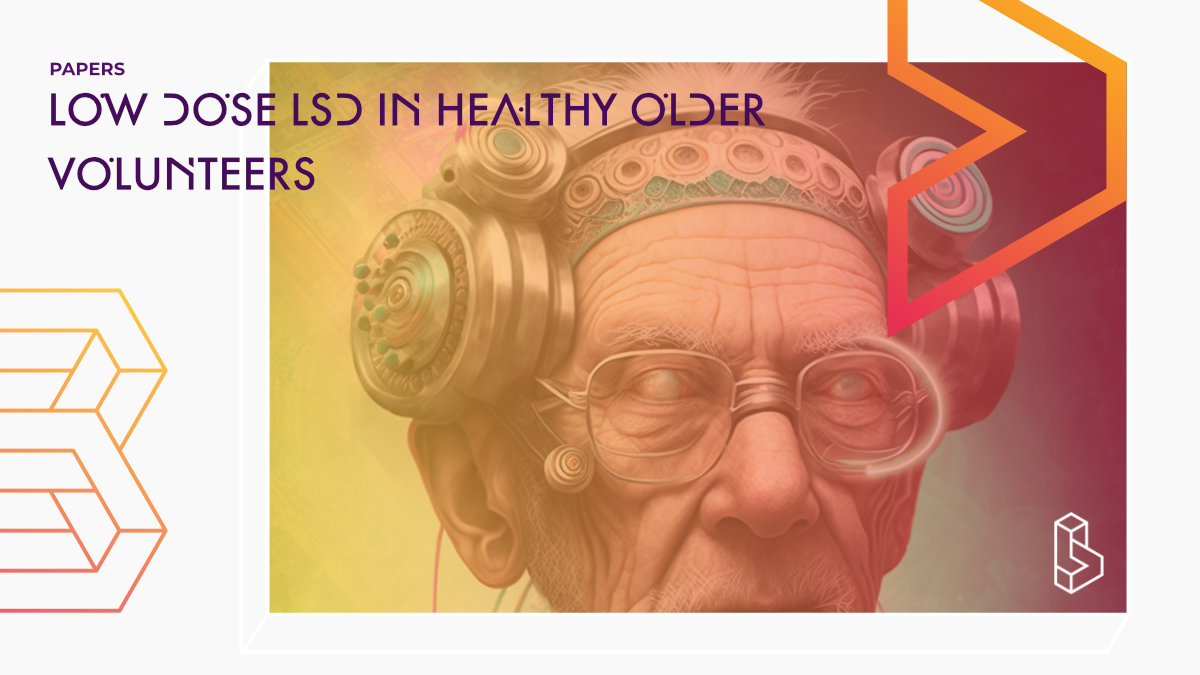This Phase I, double-blind, placebo-controlled, randomized study (n=48) indicates that LSD administration (tested up to 20µg) didn’t produce any negative effects for healthy older participants (mean age=63).
Abstract of Safety, tolerability, pharmacokinetics, and pharmacodynamics of low dose LSD in healthy older volunteers
“Abstract Research has shown that psychedelics, such as lysergic acid diethylamide (LSD), have profound anti-inflammatory properties mediated by 5-HT2A receptor signalling, supporting their evaluation as a therapeutic for neuroinflammation associated with neurodegenerative disease.
Objective This study evaluated the safety, tolerability, pharmacokinetics, and pharmacodynamics of orally repeated administration of 5 μg, 10 μg, and 20 μg LSD in older healthy individuals. In the current paper, we present safety, tolerability, pharmacokinetics, and pharmacodynamic measures related to safety, tolerability, and dose response.
Methods This was a phase 1 double-blind, placebo-controlled, randomized study. Volunteers were randomly assigned to 1 of 4 dose groups (5 μg, 10 μg, 20 μg LSD, and placebo) and received their assigned dose on six occasions (i.e., every 4 days).
Results Forty-eight older healthy volunteers (mean age = 62.9 years) received placebo (n = 12), 5 μg (n = 12), 10 μg (n = 12), or 20 μg (n = 12) LSD. LSD plasma levels were undetectable for the 5 μg group and peak blood plasma levels for the 10 μg and 20 μg groups occurred at 30 min. LSD was well tolerated, and the frequency of adverse events was no higher than for placebo. Assessments of cognition, balance, and proprioception revealed no impairment.
Conclusions Our results suggest safety and tolerability of orally administered 5 μg, 10 μg, and 20 μg LSD every fourth day over a 21-day period and support further clinical development of LSD for the treatment and prevention of Alzheimer’s disease (AD).“
Authors: Neiloufar Family, Emeline L. Maillet, Luke T. J. Williams, Erwin Krediet, Robin L. Carhart-Harris, Tim M. Williams, Charles D. Nichols, Daniel J. Goble & Shlomi Raz
Notes on Safety, tolerability, pharmacokinetics, and pharmacodynamics of low dose LSD in healthy older volunteers
This paper was included in a systematic review on microdosing psychedelics by Ona & Bouso (2020).
This paper used the same participants/data as Yanakieva et al (2018).
Summary of Safety, tolerability, pharmacokinetics, and pharmacodynamics of low dose LSD in healthy older volunteers
LSD is a classic serotonergic hallucinogenic drug from the ergoline family, and its psychoactive properties are mediated primarily through the serotonin 2A (5-HT2A) receptor.
Alzheimer’s disease (AD) is a devastating neurodegenerative condition without effective disease-modifying treatments. Pathological changes in the highly serotonergic dorsal raphe nucleus are associated with the symptoms and pathogenesis of AD, and rapid loss of 5-HT2A receptors in the cortex precedes diagnosis of mild cognitive impairment.
Find this paper
https://doi.org/10.1007/s00213-019-05417-7
Open Access | Google Scholar | Backup | 🕊
Cite this paper (APA)
Family, N., Maillet, E. L., Williams, L. T., Krediet, E., Carhart-Harris, R. L., Williams, T. M., ... & Raz, S. (2020). Safety, tolerability, pharmacokinetics, and pharmacodynamics of low dose lysergic acid diethylamide (LSD) in healthy older volunteers. Psychopharmacology, 237, 841-853.
Study details
Compounds studied
LSD
Topics studied
Safety
Healthy Subjects
Microdosing
Study characteristics
Original
Placebo-Controlled
Double-Blind
Randomized
Participants
48
Humans
Authors
Authors associated with this publication with profiles on Blossom
Erwin KredietErwin Krediet is a PhD candidate at Leiden University Medical Center and Psychologist/Researcher at ARQ National Psychotrauma Centre. He also volunteers on the program team of ICPR.
Robin Carhart-Harris
Dr. Robin Carhart-Harris is the Founding Director of the Neuroscape Psychedelics Division at UCSF. Previously he led the Psychedelic group at Imperial College London.
Charles D. Nichols
Charles D. Nichols is a professor of Pharmacology at LSU Health Sciences Center in New Orleans and sponsored researcher at Eleusis.
Institutes
Institutes associated with this publication
EleusisEleusis is a clinical-stage life sciences company that studies and develops psychedelic drugs for therapeutic use. Since 2013 the company has been researching psychedelics and is now developing ELE-Psilo (psilocybin) for depression that is in Phase I.
Compound Details
The psychedelics given at which dose and how many times
LSD 5 - 20μg | 6x
Linked Research Papers
Notable research papers that build on or are influenced by this paper
The effects of microdose LSD on time perception: a randomised, double-blind, placebo-controlled trialThis was the first double-blind and placebo-controlled study (n=48) into the effects of microdosing LSD. The topic was quite specific (time perception), but they also reported on other cognitive changes (of which there were few and at a very small scale).
Linked Clinical Trial
A Double-blind, Placebo-controlled Study to Evaluate Very Low Dose LSD in Healthy Volunteers Aged 55-75 YearsThis study was a Phase I, double-blind, placebo-controlled, randomised study of very low dose LSD.

